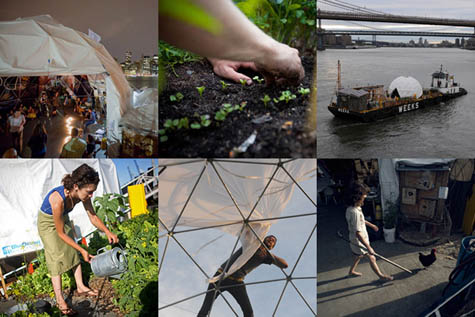If you’re near New York City tomorrow night, Friday, January 15th, Exit Art is hosting an event in honor of the Waterpod project, exploring the twin ideas of interactive architecture and “reinventing social spaces.”
 [Image: Glimpses of the Waterpod].
[Image: Glimpses of the Waterpod].
The Waterpod, if you are not familiar with it already, “was a floating, sculptural structure designed as a futuristic habitat and an experimental platform for assessing the design and efficacy of living systems fashioned to create an autonomous, fully functional marine shelter.” It traveled around the waterways of New York, bringing equal parts aquatic farm, mobile bio-utopia, and urban sci-fi to the hydroscape of the city.
As a self-sufficient, navigable living space, the Waterpod showcased the critical importance of water within the natural world. Collectively embracing the richly-patterned folkways of the five boroughs of metropolitan New York, the Waterpod reified positive interactions between communities: private and public; artistic and societal; scientific and agricultural; aquatic and terrestrial.
The New York Times described it as “an independent project [artist Mary] Mattingly dreamed up three years ago to explore the possibility of creating a self-sufficient community on the water—a kind of aquatic version of the Biosphere 2 complex built in the Arizona desert in the 1980s—that might offer an alternative to living on land in the future, if ‘our resources on land grow scarcer and sea levels rise,’ she said.”
Tomorrow night will feature three short presentations by Natalie Jeremijenko, “an artist whose background includes studies in biochemistry, physics, neuroscience and precision engineering”; architect Maria Aiolova, cofounder with Mitchell Joachim of Terreform 1; and myself, followed by a panel discussion and public Q&A. For my own part, I plan on discussing a number of hydrological topics, including the vernacular design of artificial glaciers and other kinds of “ice reserves” as a response to global water shortages, and, given time, to present a brief look at the history of weather control and urban storm cultivation.
Entrance is free, although there is a suggested donation of $5, and there is a cash bar to ease the mood of a Friday evening; things kick off at 7pm, and you will find us all gathered at 475 10th Avenue, near 37th Street. Here is a map and more info about the night in general.
Hope to see you there!
I'm going to see if I can make it. And then we could actually meet! -Katherine, of ScienceBlogs and ReadyMade…
Hey Katherine, that'd be great – I'd love to meet.
This was a great talk, so many exciting ideas in such a short time. What strikes me most is how different the three speakers approach was to the topic. BldgBlog takes a very back to the future approach, envisioning grand glacial farms aggregated by human intervention using ancient technologies. Bravo, you encourage us to think big and not wait for technology, use it!
Terreform seems to take a 'future technology will solve all our problems' and deliver utopia approach, indulging in fantastical designs for blimp buses and pillowy jetpacks. I doubt we will see any of these come to fruition but I think these bold dreamy visions are very, very important and useful in getting people talking about alternative urban design and 'thinking big'.
Natalie Jeremijenko on the other hand distinguishes herself from the first two speakers with a more pragmatic ground level approach. I commend her for practicing what she preaches by involving people in all of her experiments and research with small scale projects that directly involve people and have the potential to aggregate, gain momentum and make real changes. Her projects raise alarming awareness of the toxins we accept that are present in or direct human urban environment and what we can do to change this. She kind of made Terreform look like they were stuck in dreamland while she was actually doing things. My only criticism of her work was that terrifying screen saver used before and after her lecture that may have caused real eye damage(not sure if this was her fault or Exit arts.
I was sorry there was not more time for discussion afterward, and sorry it kind of devolved into pessimistic drivel about lack of action on environmental issues. Yes we all know that there is a problem so why don't you stop complaining and do something sir.
Thank you to all three speakers for inspiring us!